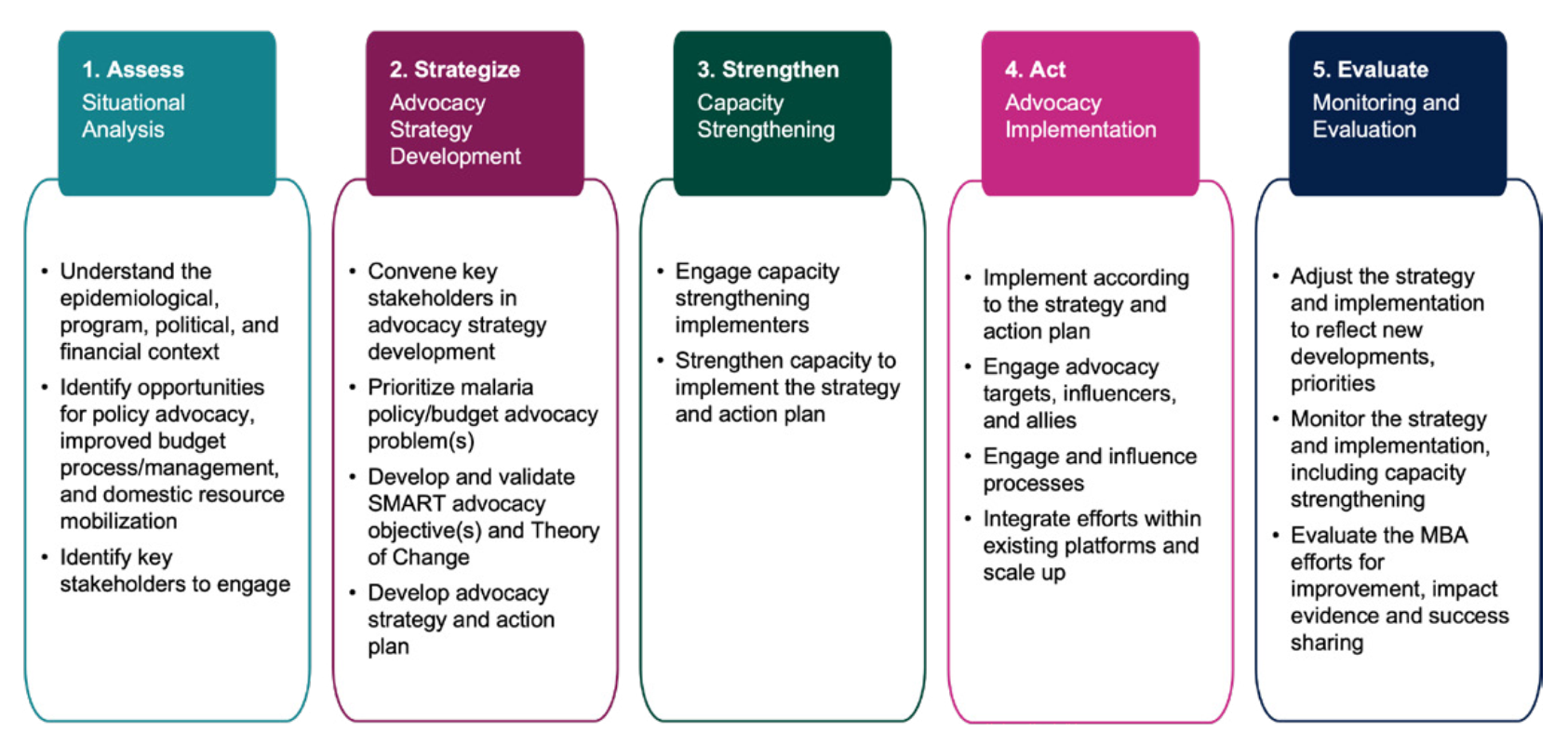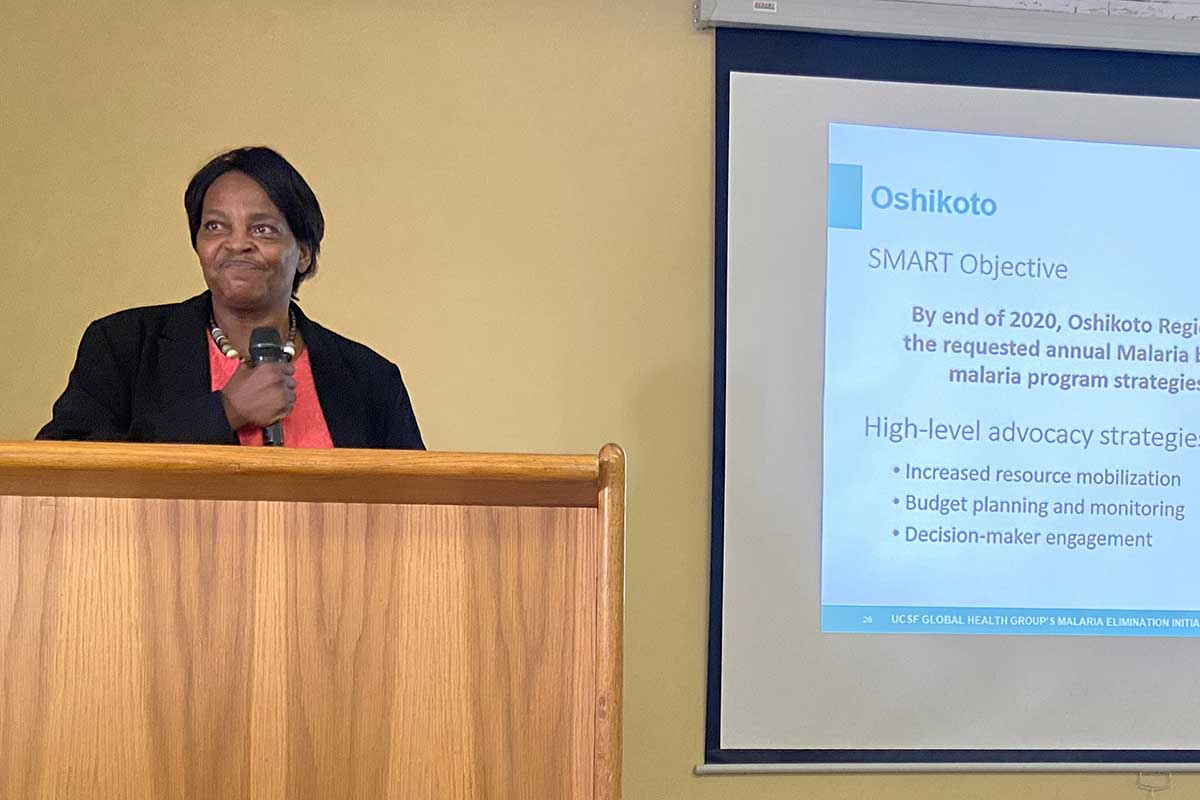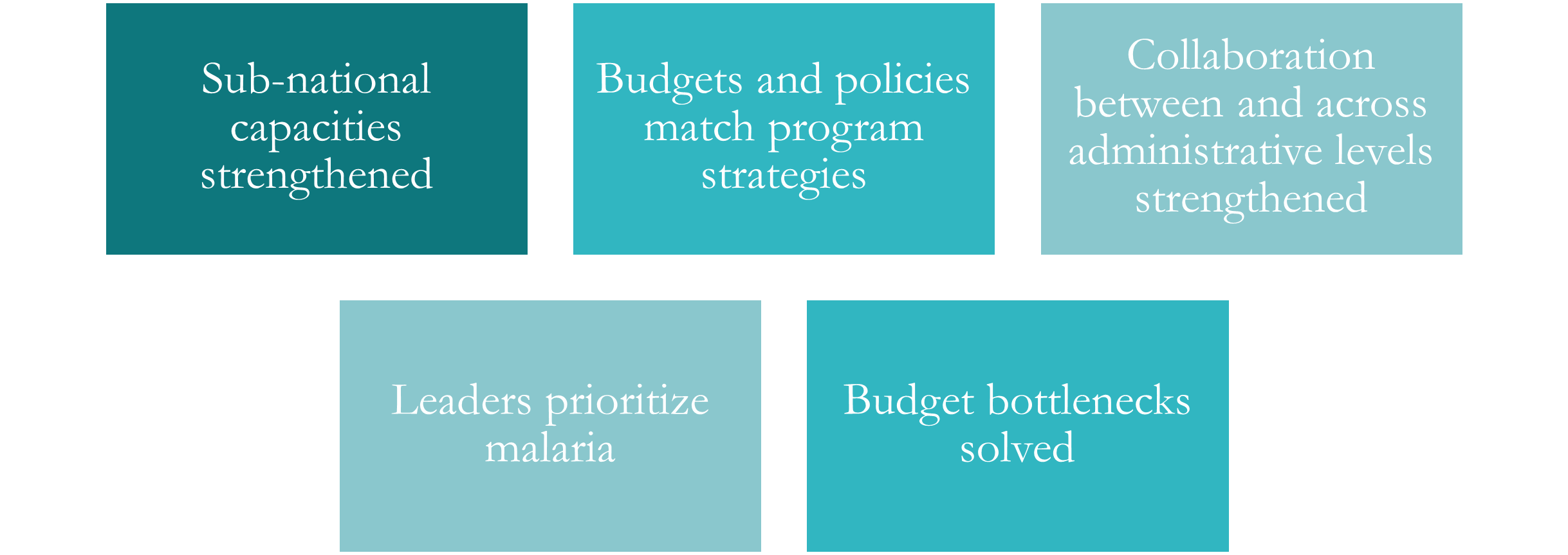Malaria budget advocacy
Since 2015, the MEI has supported countries across southern Africa and Asia Pacific in domestic resource mobilization and malaria budget advocacy. As of 2023, the MEI and its country partners have successfully mobilized over USD 2.5 million in additional domestic malaria funding and strengthened the capacity of nearly 3,000 health and administrative officials at the national and sub-national levels to pursue their budget advocacy objectives.
The MEI’s catalytic support has significantly contributed to the sustainability and scale-up of budget advocacy efforts led by country programs, as well as regional and international partners including the WHO, the Global Fund, the Faith Leader Advocacy for Malaria Elimination (FLAME), and the Asia Pacific Malaria Leaders Alliance (APLMA).
Our team of health financing, policy and budget advocacy, and program management specialists support ministries of health and partners to effectively and sustainably secure resources and political commitment to achieve a malaria-free world within a generation.
Challenging Context
Leaders in Africa, Asia Pacific, and Latin America are making ambitious commitments to eliminate malaria by 2030 or earlier. The global fight against malaria has achieved significant gains since 2000 yet the progress has stalled in recent years with many countries experiencing an increase in malaria incidence.1 Ministries of health and development assistance partners must ramp up their efforts to protect the hard-earned attainments and get back on track.
Malaria donors are placing growing emphasis on the importance of domestic financing in sustainably resourcing malaria control and elimination efforts. Despite record-breaking fundraising results, the Global Fund noted a 22% resource gap in the 2024-2026 period for countries to continue as planned.2,3 The COVID-19 pandemic and evolving health threats pose additional hurdles, leading major donors to reduce or divert investments toward other pressing health concerns.
Within malaria-endemic countries, national malaria programs are facing budget shortfalls in constrained resource environments and as policymakers' and public attention to malaria wavers. In countries with decentralized governance and health systems – and where decentralization is ongoing – gaps in subnational leadership on malaria may contribute to under-prioritization and underfunding of malaria efforts. In elimination settings, community and policy-maker awareness declines even further yet domestic financing is even more critical as ministries of health work to sustain the gains, prevent reestablishment of malaria, and prepare for the transition from donor funding.
In these contexts, enhancing financial management and budget advocacy strategies and capabilities at all levels is critical to increasing domestic financing for malaria, augmenting local ownership and governance over malaria control and elimination efforts.
1 World Health Organization. (2023). World malaria report 2023
2 The Global Fund. (n.d.). Seventh Replenishment - The Global Fund to Fight AIDS, Tuberculosis and Malaria. Retrieved November 7, 2023, from https://www.theglobalfund.org/en/seventh-replenishment/
3 The Global Fund. (2022). Global Fund Partners Pledge Record Level of Support to End Deadly Diseases, Prevent Future Pandemics. https://www.theglobalfund.org/en/news/2022/2022-09-21-global-fund-partners-pledge-support-to-end-deadly-diseases-prevent-future-pandemics/
Our Approach
The Malaria Budget Advocacy (MBA) Framework
The MEI, in close collaboration with global partners and national stakeholders, developed the MBA Framework in response to countries' rising needs for sustainable financing and domestic resource mobilization. Culminating from our years of experience working with partners across southern Africa and the Asia Pacific on budget advocacy and domestic resource mobilization, this Framework serves to guide national malaria programs, their subnational counterparts, and partners to advocate for prioritization of malaria targets in political agendas, identify sustainable financing mechanisms, and secure domestic investments in the malaria response.
The MBA Framework encompasses five modules: situational analysis, advocacy strategy development, capacity strengthening, strategy implementation, and monitoring and evaluation. Each module contains a comprehensive set of tailored theories, ready-to-apply tools, practical recommendations, guiding questions, and real-life examples. The MBA Framework can also be applied to other disease elimination programs (eg., neglected tropical diseases), programs transitioning from donor funding, and other health programs seeking to strengthen domestic financing.
The five modules of the MBA Framework

-
Assess
Situational Analysis
- Understand the epidemiological, program, political, and financial context
- Identify opportunities for policy advocacy, improved budget process/management, and domestic resource mobilization
- Identity key stakeholders to engage
-
Strategize
Advocacy Strategy Development
- Convene key stakeholders in advocacy stralegy development
- Prioritize malaria policy/budget advocacy problem(s)
- Develop and validate SMART advocacy objective(s) and Theory of Change
- Develop advocacy strategy and action plan
-
Strengthen
Capacity Strengthening
- Engage capacity strengthening implementers
- Strengthen capacity to implement the strategy and action plan
-
Act
Advocacy Implementation
- Implement according to the strategy and action plan
- Engage advocacy targets, influencers, and allies
- Engage and influence processes
- Integrate efforts within existing platforms and scale up
-
Evaluate
Monitoring and Evaluation
- Adjust the strategy and implementation to reflect new developments, priorities
- Monitor the strategy and implementation, including capacity strengthening
- Evaluate the MBA efforts for improvement, impact evidence and success sharing
Our Support

The MEI offers catalytic support to country and regional partners to adopt and implement any or all of the five modules of the MBA Framework to strengthen domestic resource mobilization, enabling an effective and sustainable country-led response. Specifically, the MEI facilitates a process to:
- Assess opportunities to:
- Align domestic financing and political engagement with national and local malaria strategies.
- Empower malaria programs and health teams to steward well-resourced malaria programs, ensuring funds are allocated and used effectively, equitably, and efficiently.
- Harness other sustainable funding channels such as UHC-related funding sources or Sin Taxes for malaria.
- Develop an advocacy strategy and theory of change to articulate advocacy priorities and plans.
- Bolster advocacy, financial management, and leadership capacities of malaria/health teams to ensure advocacy objectives are within reach.
- Provide technical assistance or co-lead the implementation of the advocacy plans to achieve the set objectives.
- Monitor and evaluate the success of advocacy implementation and identify opportunities to scale up and sustain political engagement and budget support through existing mechanisms.
Support can be in the form of technical consultation, institutional capacity transfer, and/or hand-in-hand implementation. Depending on specific needs, the timeline of support can range from six months (eg., for situational analysis and advocacy strategy development) to multi-years (eg., for a full MBA cycle and preparation for integration/scale-up).
By the end of our support, we expect the following outcomes to be attained:
MBA's expected outcomes

- Sub-national capacities strengthened
- Budgest and policies match program strategies
- Collaboration between and across administrative levels strengthened
- Leaders prioritize malaria
- Budget bottlenecks solved
Our Impact
Global and regional levels
The MEI and the Centre of Economic Governance and Accountability in Africa (CEGAA) collaborated to develop the Budget Monitoring and Expenditure Tracking training series, an online training course for malaria leaders to strengthen budget management and advocacy skills. This 14-module series includes video instruction and supplementary activities providing foundational health financing and economics knowledge, practical skills to analyze and develop budgets, and tactics to influence decision-makers.
Between 2021 and 2024, the MEI successfully transferred its Sustainability Model, including MBA approach, to the Asia Pacific Malaria Leaders Alliance (APLMA), equipping a regional entity to provide sustainability support to the Asia Pacific region moving forward.
Country level
Since 2015, MEI has partnered with the ministries of health and national malaria programs in eight countries - Cambodia, Indonesia, Lao PDR, Namibia, the Philippines, Sri Lanka, Thailand, and Vietnam- to implement the MBA approach with an average engagement period of three years. In three of these countries, the MEI and its partners mobilized US$2.5 million in additional domestic malaria funding.
Click on each country for more details of our impact:
Cambodia
Cambodia
(2021-2024)
Partners
- National Center for Parasitology, Entomology and Malaria Control
- Asia Pacific Leaders Malaria Alliance (APLMA)
- Clinton Health Access Initiative (CHAI)
Success indicators
- Creation of an advocacy strategy and recommendations for Cambodia to strengthen domestic financing post-RAI3E Grant as part of a Sustainability and Donor Transition Assessment.
- Transferred knowledge and capacitated APLMA and CHAI to implement MBA support in Cambodia according to the developed strategy through training and hand-in-hand implementation.
- Continuation of subnational-level MBA efforts led by APLMA and CHAI after the MEI's support.
Lao PDR
Lao PDR
(2023)
Partners
- Department of Communicable Diseases Control, Ministry of Health
- Center for Malariology, Parasitology, and Entomology (CMPE)
- Elixirs Sole Co., Ltd
- Asia Pacific Leaders Malaria Alliance (APLMA)
Success indicators
- Development of an assessment report to map and prioritize universal health coverage (UHC) financing opportunities for malaria financing.
- Transferred knowledge and contributed to APLMA’s 2024 sustainability initiatives in Lao PDR.
Philippines
Philippines
(2016-2019)
Partners
- Department of Health National Malaria Control and Elimination Program
- Pilipinas Shell Foundation
- Zuellig Family Foundation
Success indicators
- Between 2016-17, domestic funding for national malaria program increased by PhP101 million (US$2 million).
- Creation of the Technical Roadmap for Malaria Elimination, a tool for subnational governors to identify and improve responsiveness to local needs for malaria interventions.
- Enhanced capacity of 80+ subnational governors and health leaders in leadership and quality improvement to achieve malaria elimination.
- Secured scale-up of the capacity-strengthening proof of concept in 8 Global Fund-supported provinces at the end of the pilot.
Thailand
Thailand
(2017-2021)
Partners
- Ministry of Public Health
- Division of Vector-Borne Diseases
Success indicators
- A 102.7% increase in funding for malaria at the subnational level from THB 3.7 million (USD 104K) in 2017 to THB 7.5 million (USD 210K) in 2020.
- Creation and dissemination of 3,200+ Guide to Malaria Elimination for Thailand’s Local Administrative Organizations and the Health Network, a tool to promote local government understanding and collaboration for malaria elimination.
- By 2020, strengthened commitment and capacity of 700+ national health and government officials and nearly subnational 2,000 officials to improve local funding for malaria.
- Creation of a domestic financing tracking function in Thailand’s online malaria information system to monitor performance in securing local malaria investments.
- Co-authorship of a case study capturing results from a qualitative research study to understand the facilitators and barriers that make local governments in Thailand more or less likely to financially support malaria elimination.
- Scale-up of subnational commitment and capacity-strengthening proof of concept by WHO and the Global Fund after the MEI's support.
Indonesia
Indonesia
(2017, 2023)
Partners
- Sub-Directorate of Malaria, Ministry of Health
- University of Indonesia
- Asia Pacific Leaders Malaria Alliance (APLMA)
- Gadjah Mada University (UGM)
Success indicators
- Co-authorship of an investment case on country-level resource mobilization for malaria elimination.
- Transferred knowledge and capacitated APLMA and UGM to implement MBA support in Indonesia.
Namibia
Namibia
(2019-2021)
Partners
- Ministry of Health and Social Services
- National Vector-borne Diseases Control Programme
- Centre of Economic Governance and Accountability in Africa
Success indicators
- Establishment and institutionalization of decentralized, multi-sectoral Malaria Elimination Task Forces (METFs) in 4/6 malaria-endemic regions.
- Strengthened advocacy capacity and knowledge of budget processes to 100 government stakeholders and multi-sectoral coalitions of malaria advocates.
- Development of a Regional Guide to Sustainable Domestic Malaria Financing in Namibia for METFs and their partners to improve subnational malaria budget allocations.
- Publication of a peer-reviewed paper in the American Journal of Tropical Hygiene and Medicine on the impact of the MBA approach paired with the MEI’s LEAD work.
- Continuation and scale-up of advocacy activities by METFs and the J.C. Flowers Foundation-supported Faith Leader Advocacy for Malaria Elimination after the MEI's support.
Sri Lanka
Sri Lanka
(2015-2018)
Partners
- Ministry of Health
- Anti-Malaria Campaign
Success indicators
- By 2017, domestic financing increased by 34%, resulting in US$250K in additional funding for malaria.
- Creation of a new malaria capital expenditure budget line through direct meetings with key government and ministry leaders.
- Adaptation and dissemination of the World Bank Health and Development project planning tool to inform sub-national annual budget requests.
- Significant boost in political buy-in among subnational leaders on the need for continued vigilance and sufficient funding for POR through a cross-country 'roadshow' tour.
Vietnam
Vietnam
(2021-2024)
Partners
- National Institute of Malariology, Parasitology, and Entomology
- Asia Pacific Leaders Malaria Alliance (APLMA)
- Clinton Health Access Initiative (CHAI)
Success indicators
- Development of a situational analysis report and advocacy strategy for Vietnam to strengthen domestic financing post-RAI3E Grant.
- Transferred knowledge and capacitated APLMA and CHAI to implement MBA support in Vietnam according to the developed strategy through training and hand-in-hand implementation.
- Continuation and expansion of subnational-level MBA efforts led by APLMA and CHAI after the MEI's support.
Read our country case studies for what we did.
Success Factors
We recognize the following success factors in our work to strengthen and sustain domestic financing and subnational ownership. The MBA process should be:
- Country-led and country-driven.
- Highly collaborative, multi-sectoral, and inclusive of subnational and community leadership.
- Opportunistic to take advantage of local and global budget advocacy expertise to strengthen budget advocacy capacity of malaria and health teams.
- Designed and implemented with sustainability in mind.
Contact Us
Connect with us via mei@ucsf.edu to learn more about how we can work together to employ the MBA approach in your setting.